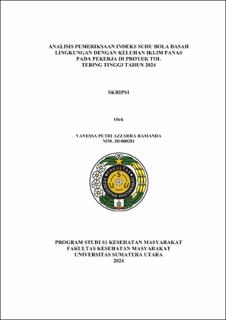| dc.description.abstract | The working climate is a combination of air temperature, air humidity, air flow
speed and radiant heat. Based on Peraturan Menteri Ketenagakerjaan Nomor 5
Tahun 2018, a comfortable room temperature for workers ranges between 23°C -
26°C with humidity 40% - 60%. The work climate can cause health problems for
workers if they are exposed to extreme hot or cold conditions with levels exceeding
the threshold values determined by health standards. This study aims to analyze the
examination of the environmental wet bulb globe temperature index with
complaints of hot climate among workers on the Tebing Tinggi turnpike project in
2024. Health effects arising from heat stress are divided into acute effects and
chronic effects. Health effects due to heat exposure on a person can include
disruption of the function of certain organs and heat-related illness or heat-related
disorders, such as cramps, fatigue, fainting, stroke, and lack of replacement of body
fluids/dehydration. This research is a quantitative study with a retrospective cross
sectional research design. Data analysis used the Spearman correlation test. The
data used is secondary data obtained from the company PT. X. The sample size is
180 respondents. The Wet Bulb Temperature Index level measured every day for a
year has results that exceed the threshold value in a working climate, namely
27.5°C. It is known that the average value of the Wet Bulb Temperature Index on
the project each month is ≥ 30°C. Based on the results of research on 180
respondents, it was found that dehydration health complaints were the largest with
the number 58 (32.2%), 52 (28.9%) in heat exhaustion (excessive sweating), 43
(23.9%) in heat rash, and the least in heat stress amounting to 27 (15%). The results
of the bivariate test show that there is an influence of the variables length of work
and hot work climate on health complaints. The suggestion in this research is to
ensure that project workers do not become dehydrated by recommending that
workers, especially those in hot environments with moderate to heavy activities,
should consume 1 glass of water every 15 minutes to avoid dehydration. Relevant
parties can also add drinking water facilities for project workers | en_US |


